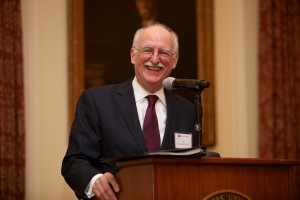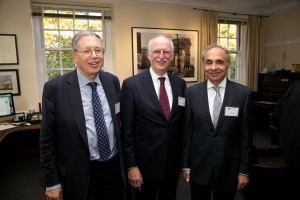At the 11th annual Friedrich A. von Hayek Lecture, Douglas Ginsburg, senior judge of the US Court of Appeals for the District of Columbia Circuit, delivered “Illiberal Administrative Law,” a robust rejoinder to a recent article by two Harvard Law professors criticizing what they consider to be the DC Circuit’s shift to the right.
Published in the Winter 2015 University of Chicago Law Review, “Libertarian Administrative Law” accused the DC Circuit of “moving in libertarian directions without sufficient warrant in existing sources of law, including the decisions of the Supreme Court itself.” The authors, Cass Sunstein and Adrian Vermeule, named Ginsburg—who was appointed to the DC Circuit in 1986 and served as chief judge from 2001 to 2008—among those judges who have shown “identifiable ideological valence,” calling him “one of the architects of some principles of libertarian administrative law.”
In his October 15 Hayek Lecture, co-sponsored by the Classical Liberal Institute (CLI) and the NYU Journal of Law & Liberty, Ginsburg responded pointedly: “My purpose is not to defend my court or any decision I participated in…but rather to remind the Harvard team of just what administrative law is and is meant to do.” Returning to the foundational Administrative Procedure Act (APA) of 1946, which sets out the procedural guidelines for administrative agencies, Ginsburg cast it as grounded in “classical liberal tradition,” saying it “emphasizes limited government, checks and balances, and a strong protection of individual rights.”
But speaking from his position in the DC Circuit, which hears most of the challenges to agency actions brought under the APA, he argued that administrative law has, over the past several decades, drifted far from the APA’s classical liberal goals. The problem in administrative law does not lie with judicial ideologues, he concluded, but with “doctrines of extreme deference by which the Supreme Court has relieved the judiciary in all but the most egregious cases of its responsibility to provide meaningful review.”
As an example of how difficult it has become for the judiciary to check what the Supreme Court once deemed “administrators whose zeal might otherwise have carried them to excesses not contemplated in legislation creating their offices,” he cited Michigan v. Environmental Protection Agency (EPA). The EPA, Ginsburg said, had ignored the costs of new power plant regulations estimated at $9.6 billion a year, with the quantifiable benefits only totaling $4-6 million a year: “That’s 1/2000th of the difference.” The DC Circuit upheld the agency’s policy, drawing on the so-called Chevron deference established in the 1984 landmark case, which holds that agencies, not the courts, are free to interpret ambiguous statutes. Yet Ginsburg supported the dissent’s claim that the EPA had failed in simple common sense by not taking costs into account.
The Supreme Court later overturned the lower court’s ruling, but Ginsburg was disappointed by the five-to-four split: “This should not have been a close case.” For him, Michigan v. EPA amounted to that rare instance in which the Supreme Court did not blindly defer to agency discretion to interpret congressional statutes. The closeness of the vote, he said, suggested how unwilling the Court has become to rule against agency overreach.
In addition to Chevron deference, other practices troubling Ginsburg included the ability of agencies to circumvent submitting new ideas to public discussion by presenting them as policy statements, and judicial presumption that the government is acting in good faith when individuals bring cases against it. “None of them arises from the APA itself,” he said, and all contribute to a “legal regime that insulates agencies from correction.”
“The marginalization of the courts in contemporary administrative law,” said Ginsburg, “should be a concern to all who believe in our liberal tradition and an independent judiciary providing a check on executive discretion with the simple duty of saying what the law is.”


